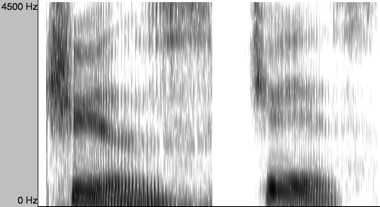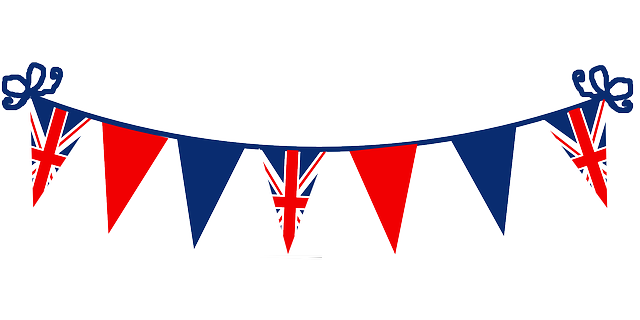Funny old vowels
 This weekend Britons will be sitting down to eat and drink in the rainy streets, to mark the 60 years since Elizabeth II was crowned in an era when such cheerful endurance was expected as a norm. Tesco, the UK’s largest supermarket chain, is doing its bit by advertizing cut-price party food in the style of the 1950s.
This weekend Britons will be sitting down to eat and drink in the rainy streets, to mark the 60 years since Elizabeth II was crowned in an era when such cheerful endurance was expected as a norm. Tesco, the UK’s largest supermarket chain, is doing its bit by advertizing cut-price party food in the style of the 1950s.
Britain didn’t actually allow TV advertizing in 1952, but these retro ads do feature an elaborate and comical recreation of Received Pronunciation vowels. These days we rarely hear on TV this bygone vowel system which Brits now find so amusing, and I thought non-Brits might enjoy a few illustrations.
Unsurprisingly, the ad features several examples of the RP TRAP vowel [æ], which always gets attention when Brits recreate the posh talk of yesteryear. Here, from the ad, are smashing range of things followed by and these strawberries:
The contemporary standard BrE vowel (as I’ve described more extensively in another post) is simply [a]. This is a more natural vowel than the non-cardinal [æ], in the technical sense of occurring far more commonly in the world’s languages, and is therefore easier to learn. Here is Daniel Jones demonstrating [a], followed by smash and and from the online Macmillan and Cambridge dictionaries:
(Note, however, that the dictionaries transcribe these and the other words in this post with the vowels of the 1950s, not with the phonetic qualities of their more contemporary audio clips.)
An nice illustration of the shift from [æ] to [a] occurred during last year’s royal wedding vows, when the Archbishop of Canterbury’s old-school C[æ]therine was followed by Prince William’s more contemporary C[a]therine:
RP’s DRESS vowel [e̞] was also closer than its contemporary value, as demonstrated by sixty percent and yes from the ad:
Contemporary DRESS is [ɛ]:
The contemporary FACE diphthong also begins with [ɛ], whereas in RP it was a much narrower diphthong, [e̞ɪ]. Compare reign from the ad and from Cambridge online:
The RP PRICE diphthong [aɪ] also began further “clockwise” in the vowel space than it does today, as parodied in right royal knees-up:
The contemporary diphthong begins further back, with a quality better transcribed as [ɑ]. Compare the ad’s right royal with right from Macmillan online:
The ad also contains a beautiful parody of the [ɪ] ending of RP’s diphthongs, when this actress produces the old-fashioned exclamation I say!
Here are authentic [eɪ] antiques from old films:
Today this [ɪ]-ending is comically quaint, especially phrase-finally. The contemporary FACE and PRICE diphthongs are more accurately represented as [ɛi/ɛj] and [ɑi/ɑj].
Another marked feature of RP was its centring diphthongs. As I’ve discussed in other posts, SQUARE is now a monophthong like NURSE, START and NORTH; NEAR is now widely monophthongal or disyllabic, like WIRE and SOUR; while CURE has disintegrated into a range of possibilities, none of which is well described as a centring diphthong. But the Tesco ad nicely recreates the old [ɪə] when a celebrating crowd calls out cheers:
The old-fashioned glide from short [ɪ] to (prolonged) [ə] is quite audible even when shouted by a crowd. Contemporary NEAR is generally heard either as a sequence of FLEECE + schwa, or ‘smoothed’ as a monophthong, [ɪː]. Conveniently, the Cambridge and Macmillan dictionaries demonstrate both of these options – Cambridge giving us the FLEECE + ə option, Macmillan the smoothed monophthong:

In my post on SQUARE, I suggested that young actors today are unable or unwilling to produce RP vowels even in period dramas where they would be historically appropriate, such as Downton Abbey. The painstaking vowel recreations from Tesco show that my point should be qualified: clearly, directors can get these vowels out of performers if they really want to. The difference, of course, is that dramas like Downton Abbey are meant to be taken seriously, whereas the Tesco ad is meant to be silly, which it certainly is.
So [tʃɪəz] to Tesco for demonstrating that the RP vowel system – still enthroned in our dictionary transcriptions after 60 glorious years – strikes contemporary Brits as pretty funny.


Geoff, your readers might like to have a look at this article of mine as well:
http://alex-ateachersthoughts.blogspot.it/2011/04/some-old-fashioned-sounds.html
The TRAP vowel in the first clip sounds closer to [ɛ] than [æ] to my ear.
Thanks Jason, you were right – in accents that really have æ, like London-Estuary, classic R.P. and General American, it often shades into [ɛ], which isn’t the case with contemporary Standard Brit TRAP. I’ve changed the first clip to include better examples.
The commentator in the TESCO advert also uses a long THOUGHT vowel in phrases such as “60 % off”, though he does it inconsistently.
So may I express a wish? Could you somehow do a big, detailed post on the Upper Received Pronunciation of old and delineate all the vowels and peculiarities and correct transcription choices as well as add a few bibliography entries for those who wish to study it all in a bit of detail?
Also could you illustrate how the spectrogram clearly shows the smoothing and the varisyllabicity of the contemporary NEAR ‘diphthong’?
I’d say that the only one of the old-fashioned vowels that is (more-or-less) extinct is [e] in DRESS. The others are still used by some people, RP or not.
The recording of each day sounds monophthongal with [de:] to me. This sounds likes the typical Yorkshire/Lancashire pronunciation of the word. I’m surprised that this was considered RP. Is there anyone left in the south of England who says [de:]?
It’s this system as a whole that’s “bygone” from prime time today: in order to sound comically out-of-date, these performers have made their vowels generally more like the dictionary symbols. Individually, of course, all vowels survive here or there, e.g. [e] in DRESS down under.
You’re right that the each day that I put up was hardly diphthongal. For me, “eɪ” is unsatisfactory not merely because it’s old-fashioned but because IPA [e] and [ɪ] are barely distinguishable. Anyway, I’ve changed the clip to avoid/decrease confusion. And since you were surprised that it might be considered R.P., you might like to check out the Queen in 1957 saying Christmas Day here – that’s hardly diphthongal either.
You’re correct. I find this incredible. The only time that I’ve known [e:] for FACE be included within RP would be in cases of smoothing, but these don’t appear to be environments for smoothing. I have paid attention to the Queen’s speech before. I don’t think that she would say [e:] any more, although this point has not been mentioned by those who say that her pronunciation has changed.
For the record, I use [e:] in FACE most of the time and no one’s ever said that I sound like an old-fashioned RP speaker.
Geoff, I broadly agree with you, but there’s a case to be made for non-cardinal [æ] in contemporary RP, as [a] is certainly more open in, say, south Welsh TRAP.
As for ‘right royal knees-up’, the [aɪ] sounds more Yorkshire to me. There is inconsistency with [ɾ] too, which would have been prevalent before vowels but never at the start of words (unless word starts with vowel and preceding word ends with ‘r’).
Much more to talk about here, but for a better jokey take on older RP sounds, see Harry Enfield: http://www.youtube.com/watch?v=LS37SNYjg8w.
I agree. The South Welsh TRAP vowel sounds distinct from the newer RP/southeastern English realization to my ear. So does the northern English TRAP vowel. All of these are usually transcribed by linguists as [a] though.
The “right” sounds more like [ai] than [aɪ] to me. I suppose that Tesco can’t be completely accurate.
My first reply didn’t post so here is another attempt:
“Geoff, I broadly agree with you, but there’s a case to be made for non-cardinal [æ] in contemporary RP, as [a] is certainly more open in, say, south Welsh TRAP.”
I agree. I can hear a difference between the newer RP/southeastern English realization of TRAP and the South Welsh realization of the same phoneme. I can also hear a difference between the former and the northern English pronunciation of TRAP. However, all of these are transcribed as [a] by linguists.
Simon and Jason, thanks for commenting. You have to distinguish triangular and quadrilateral vowel systems. Triangular systems, which are the most common in the world’s languages, have only one quality at the bottom of the vowel space. Such systems include Spanish, Japanese, Russian, Mandarin, etc., and the Englishes of Scotland and Wales. Quadrilateral systems, by contrast, have a front-back distinction in the open vowels; these include Finnish, Hungarian and standard BrE and AmE.
The cardinal vowel system, in order to encompass all possibilities, is of course quadrilateral, with low front [a] and low back [ɑ]. For triangular systems, the convention among linguists is to use the typographically more common symbol a, though this will typically be intermediate between cardinal [a] and [ɑ]. For example, south Welsh short TRAP and long PALM are generally further back than cardinal [a] (demonstrated by Daniel Jones above). So is the neutralized TRAP/PALM of Scotland.
Contemporary standard BrE TRAP, however, is well described by [a]. If linguists were analyzing standard BrE today for the first time, without any inherited R.P. baggage, they wouldn’t resort to non-cardinal [æ]. In London-Estuary and AmE, on the other hand, there is justification for [æ].
Simon – I linked to that famous Harry Enfield clip at the end of my previous post. Those sketches are now about 20 years old; the present post tried to show with topicality that today’s performers still have some ability to reconstruct the old vowels of the dictionaries. Obviously Harry Enfield, Paul Whitehouse et al were particularly good at this kind of thing, but it’s likely that the ability to mimic R.P. is somewhat decreasing as it recedes ever further into the past.
Which film is several days clip from?
It’s from a 1930s Pathé film. The Pathé newsreel website is a treasure trove for R.P.
Would it be somehow possible to link to them, it would be wonderful to hear the whole thing? Not only from the British Pathé archives, but also those clips from Olivier’s Shakespeare speeches, Rebecca and so on.
Wow, what a hilarious and informative blog post! I couldn’t help but chuckle at the anecdotes shared by the author about their encounter with those “funny old vowels.” It reminded me of my own misadventures trying to navigate the intricacies of English pronunciation, leaving me both entertained and grateful for the author’s expertise in shedding light on such peculiar linguistic quirks.
I once tried mimicking those old RP vowels at a dinner party, and it had everyone in stitches! This post wonderfully captures the nostalgia and amusement of bygone pronunciations. Kudos to Tesco for bringing humor to our ever-evolving language!